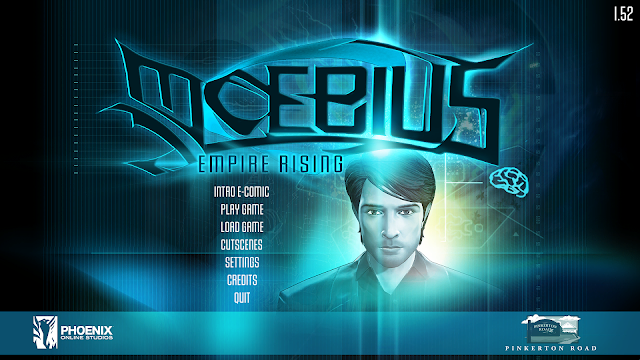Moebius: Empire Rising
Moebius: Empire Rising
|
Type |
Point and click adventure |
|
Single or multiplayer |
Singleplayer |
|
Developer |
|
|
Publisher |
|
|
Fun |
2/5 |
|
Difficulty |
3/5 |
Moebius: Empire Rising is an example of what happens when you have a promising idea for a game but fail in almost every aspect of producing it. I’ve had a tough time finishing it, not for the difficulty of its puzzles, but for the amateurism of its story and characters.
Let’s start with the technical details. Considering the graphics, I must give credit where credit is due. The locations you visit in this game, though not plentiful, at least are rendered quite nicely, with vibrant colors and detailed backgrounds. Unfortunately, the same cannot be said about the characters – not by a long shot.
Every movement the characters make is sloppy and choppy. The animations take a bit to get into action, like a runner from a kneeling start. Sometimes the characters will stay in place, rotate around, and then start walking. The lip syncing is even worse and belongs in a game made in 2004, not 2014.
However, I would have been more than willing to let it slide, had it not been for the truly awful sound experience. I am not talking about the background noise or the soundtrack either. If the voice actors made it their goal to sound as uninterested, haughty, annoying, and supercilious as possible, they have achieved it. In some cases, they are atrocious.
As with any
other point and click game, there aren’t any specifically novel ways of interacting
with the environment. The main characters can examine, pick up, and use items
around the game world, and in a few instances combine them, which is pretty
normal for this type of game.
The only thing that slightly helps the situation, apart from the background graphics, is the story. The plot revolves around Malachi Rector, an antique dealer who is employed by a mysterious Mr. Dexter from an even more mysterious organization by the name of FITA, to investigate different people around the world and their possible connections to famous people in the past.
This part, and especially the minigame of the actual comparisons that Malachi makes, was the most successful part. It reminded me in a certain way of Assassin’s Creed and its Animus database of famous people from the past, although in a much different sense.
Again, however, the bad parts outweigh the good. The main character is exasperating, as he possesses a “genius level intellect”, that all others around him seem to confirm at some point or another. This intellect reflects in the sherlockian conclusions he makes about the people he meets. Of course, he is far from the famous detective, as these conclusions, presented as choices for you to make based on deduction, are often far from common sense. When he is presented with a problem, he goes into a sort of trance, where ideas literally pop out as words on the screen – a quite banal and simplistic way of showing that his mind is brilliant.
I have mentioned bad voice acting, and that is most obvious in the voice of the second main character, David Walker, who is ex-Special Forces. That fact seems to be very important, as every other sentence he utters is about his time in the army. He is also connected to Malachi, and not just through the obvious attraction they awkwardly avoid throughout the game. The voice actor stumbles through his lines as the character once did in the military. Did I also mention he was in the army?
In the course of the game you will travel from New York to Venice, Zurich, Cairo, Paris and more. These locations are nothing more than a set of stereotypical streets and interiors, not entire cities to explore, yet all of them are connected to the global conspiracy.
Is Moebius: Empire Rising a good game? No, I wouldn’t say that. Is it interesting? Not as much as I’d hoped. But that is ok. Sometimes you have to play bad games in order to appreciate the better ones, to waddle your way through Moebius in order to value Gabriel Knight – and then realize that both come from the same author.





Comments
Post a Comment